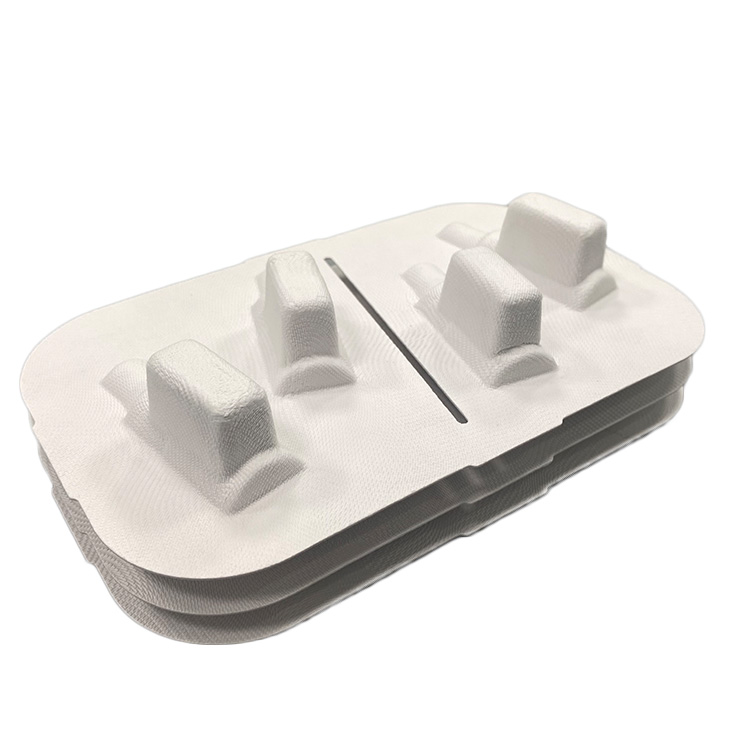In recent years, there has been a growing awareness of the environmental impact of packaging materials, leading many industries to seek sustainable alternatives. Molded pulp packaging has emerged as a popular choice due to its eco-friendly properties and versatility. In this article, we will delve into the environmental benefits of molded pulp packaging, examining its role in reducing waste, conserving resources, and mitigating environmental pollution.
1. Biodegradability and Compostability:
Molded pulp packaging is made from natural fibers derived from recycled paper or renewable sources such as bamboo or sugarcane bagasse. Unlike traditional plastic packaging, which can persist in the environment for hundreds of years, molded pulp packaging is biodegradable and compostable. When disposed of, it breaks down naturally into organic matter, returning nutrients to the soil without leaving behind harmful residues or microplastics.
2. Renewable Resource Utilization:
One of the key environmental benefits of molded pulp packaging is its reliance on renewable resources. The production of molded pulp begins with the extraction of cellulose fibers from sustainably managed forests or agricultural residues. These fibers are then processed into pulp and molded into various packaging shapes using water-based techniques. By utilizing renewable resources, molded pulp packaging helps reduce dependence on finite fossil fuels and non-renewable materials.

3. Energy and Water Efficiency:
The manufacturing process of molded pulp packaging is inherently energy-efficient compared to other packaging materials such as plastic or metal. It requires less energy input and generates fewer greenhouse gas emissions, contributing to a lower carbon footprint. Additionally, molded pulp production typically involves water-based processes that consume minimal water and produce little wastewater, further reducing environmental impact.
4. Waste Reduction and Recycling:
Molded pulp packaging is part of a closed-loop system that promotes waste reduction and recycling. It is often made from recycled paper or cardboard fibers, diverting post-consumer waste from landfills and giving it a new life as packaging material. After use, molded pulp packaging can be recycled through existing paper recycling infrastructure, contributing to circular economy principles and reducing the demand for virgin materials.
5. Lightweight and Space-Efficient:
Another environmental benefit of molded pulp packaging is its lightweight and space-efficient design. Compared to traditional packaging materials such as plastic or glass, molded pulp packaging is lighter in weight, reducing transportation-related emissions and fuel consumption. Its compact and stackable nature also optimizes storage and shipping space, leading to more efficient logistics and lower carbon emissions throughout the supply chain.

6. Versatility and Customization:
Molded pulp packaging offers versatility and customization options to meet the diverse needs of different industries and products. It can be molded into various shapes, sizes, and configurations, providing tailored solutions for packaging applications ranging from electronics to food and beverage. By eliminating the need for excess packaging material and minimizing package size, molded pulp packaging helps reduce material waste and environmental impact.
7. Consumer Preference and Brand Image:
As consumers become increasingly eco-conscious, brands are embracing sustainable packaging solutions such as molded pulp packaging to align with consumer values and enhance brand image. Products packaged in molded pulp are often perceived as environmentally friendly and socially responsible, appealing to environmentally conscious consumers and driving positive brand perception and loyalty.
Conclusion:
In conclusion, molded pulp packaging offers a multitude of environmental benefits that contribute to sustainability and resource conservation. From its biodegradability and renewable resource utilization to its energy and water efficiency, molded pulp packaging represents a greener alternative to conventional packaging materials. By choosing molded pulp packaging, businesses can reduce waste, minimize environmental impact, and meet the growing demand for sustainable packaging solutions in today's eco-conscious marketplace.

